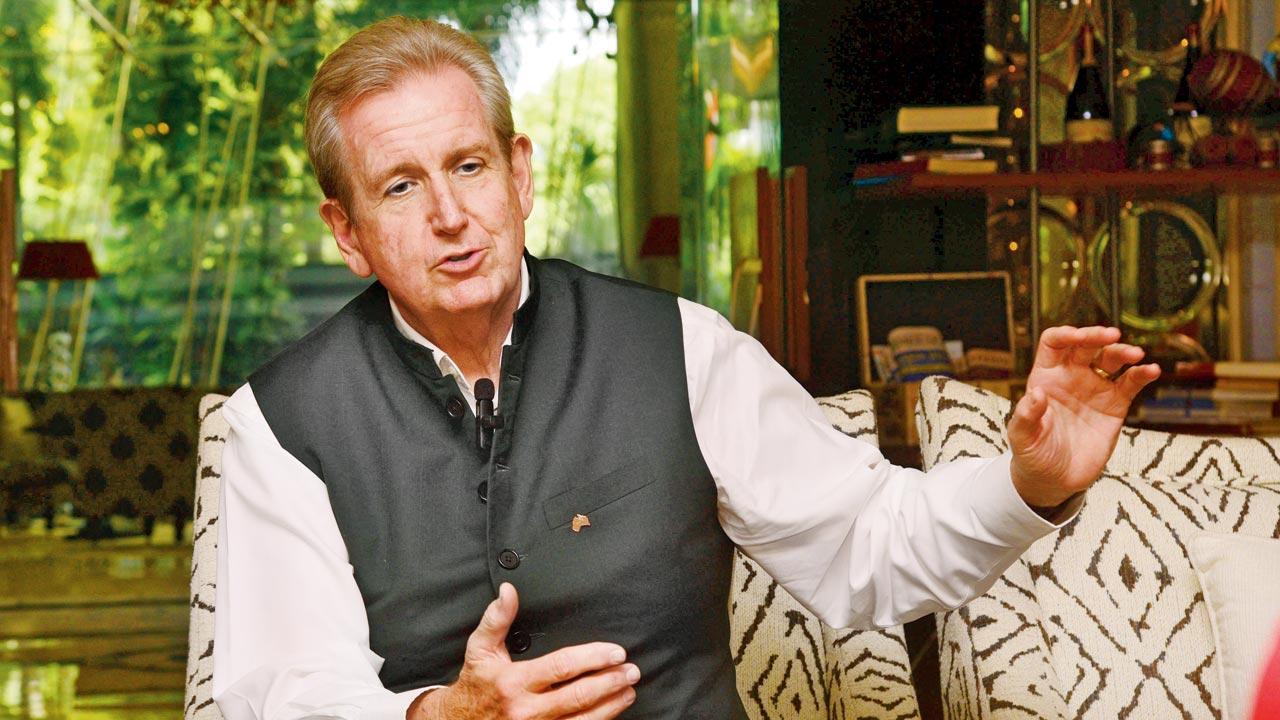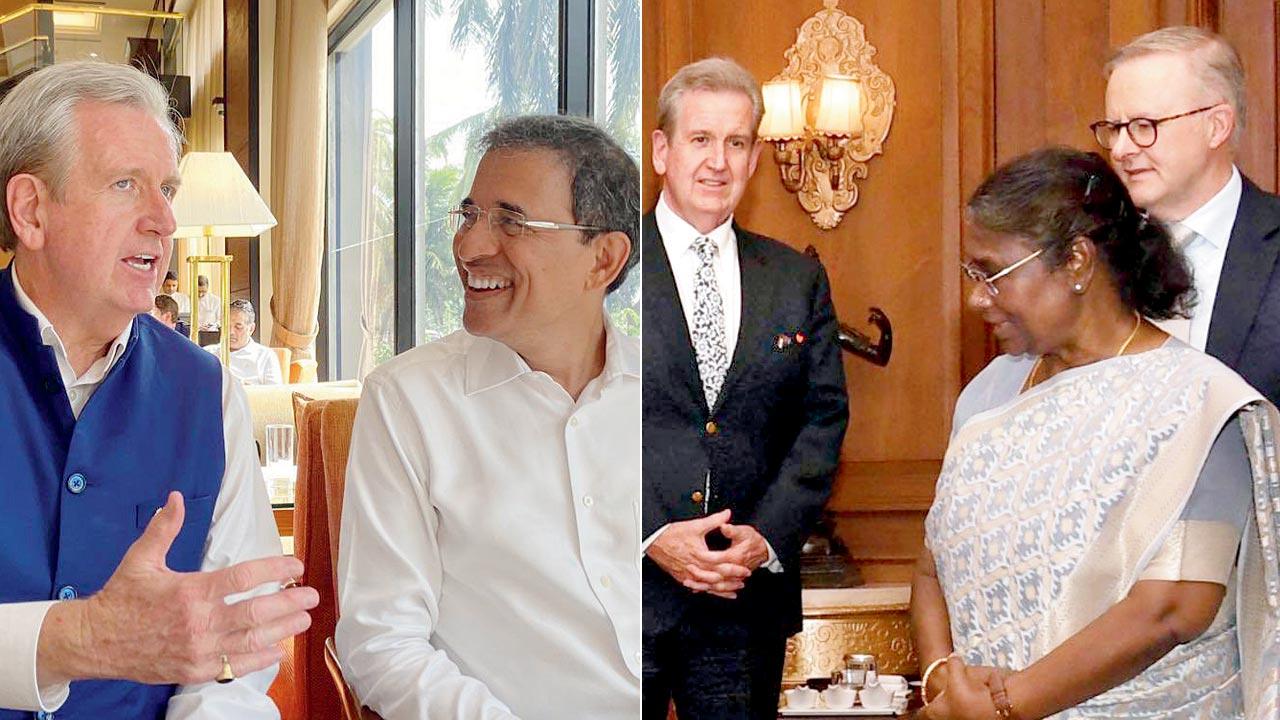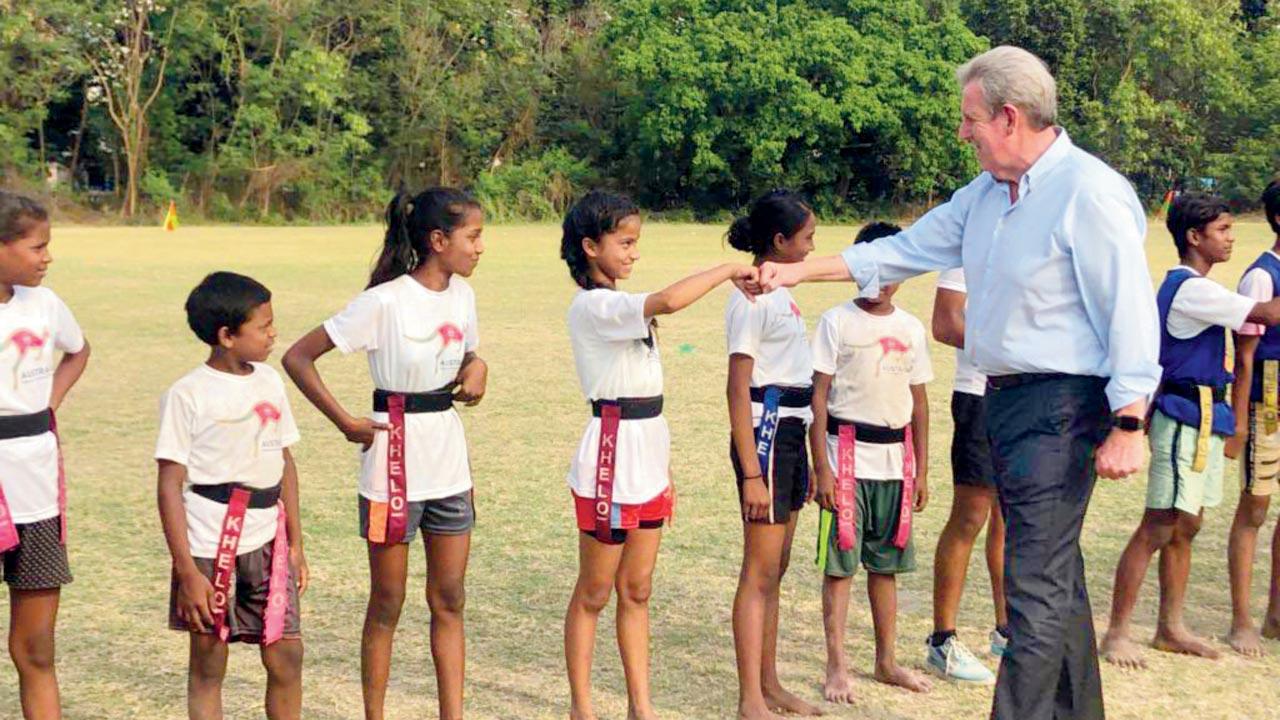Barry O’Farrell picks innovation and confidence as two India traits he admires and ruminates on what makes him Bharat ka champion

Barry O’Farrell returns to Australia after a three-year stint as Australian High Commissioner to India. Pic/Pradeep Dhivar
 Unlike most of his counterparts, Barry O’Farrell, Australian High Commissioner to India, prefers the sleeveless bandhgala jacket and no tie. Ask him if this is the Indian influence on his fashion choices, and he agrees, adding that he doesn’t like full jackets and wants to throw off colonial shackles by not wearing a tie.
Unlike most of his counterparts, Barry O’Farrell, Australian High Commissioner to India, prefers the sleeveless bandhgala jacket and no tie. Ask him if this is the Indian influence on his fashion choices, and he agrees, adding that he doesn’t like full jackets and wants to throw off colonial shackles by not wearing a tie.
ADVERTISEMENT
An established politician and vocal Indo-Australian relationship advocate for 13 years, O’Farrell is on his way back home after a successful three-year term, and will be succeeded by Philip Green. In a free-wheeling chat with mid-day, O’Farrell talks about how he has seen the India–Australia scenario change, and why his love for butter chicken won’t wane.
Edited excerpts from the interview.
You have worked for a significant period of time in the field of Indo-Australian relations. What has been your experience with India so far?
I’ve been coming here since 2010. India is far more confident about its place in the world than when I first arrived. If I had to say something about it, I’d talk about confidence and innovation. As I experienced first-hand during the COVID pandemic, your innovation knows no bounds.
 O’Farrell’s with commentator Harsha Bhogle and Indian President Draupadi Murmu. Pic Courtesy/Twitter
O’Farrell’s with commentator Harsha Bhogle and Indian President Draupadi Murmu. Pic Courtesy/Twitter
What is the major change you have observed since 2010?
In the year 2010, I was still getting questions about whether Australia was a safe place for students to study in because a small number of assaults had been reported a few years earlier. Today, I can tell every Indian, yes, we are safe and don’t take my word for it. When Indian students were stranded in Australia during the pandemic, 80 per cent decided to stay back in Australia. They clearly felt safe to stay put and study online. They were being supported by the community at large, by the universities and the various stakeholders.
And you’ve been vocal about your support, like when temples in Australia were vandalised in March.
We regard ourselves as a successful multicultural country, with more than 250 ancestries, including a growing Indian diaspora. We have laws that are anti-hate speech, anti-vandalism and anti-graffiti on temples. It is as insulting to an Australian to witness such occurrences in what we think is a peaceful and successful country, as it is to for Hindus in India.
 O’Farrell’s Twitter feed shows he is passionate about all things India. Seen here interacting with school students in West Bengal on West Bengal Day earlier this month. Pic Courtesy/Twitter
O’Farrell’s Twitter feed shows he is passionate about all things India. Seen here interacting with school students in West Bengal on West Bengal Day earlier this month. Pic Courtesy/Twitter
What has been your most memorable experience of living and working in India?
Three years after I arrived, we finally had (Australian) Prime Minister Anthony Albanese visit. COVID had prevented previous attempts. It was great to be with him in Ahmedabad for Diwali, but even more when he visited INS Vikrant in Mumbai. One is a festival which is part of a great civilization and the other is India’s first indigenous aircraft carrier, which pays respect to the innovation and the entrepreneurial spirit of
this country.
Have you found favourite Indian foods?
Look at me! I am a foodie. I need to be less of a food lover, I think (laughs). Just about every suburb in Australia has an Indian restaurant. And I am convinced that from a young age, Australians fall in love with what we call butter chicken and what you call murg makhani. Although it is not very sophisticated, not the fanciest, not the most subtle Indian dish. I have since discovered that here, you do great things with cauliflower which I never thought were possible. I hated broccoli as a child but you’ve managed to, in a variety of ways, make it edible. I love the southern fish curries. I was introduced to Mumbai’s street food by my predecessor and his staff where I arrived in 2010. And I have enjoyed chaat all over India.
Without being unkind to my UK colleague (British High Commissioner Alex Ellis), I’ll say that Twitter users, both here and in the US call you out if you are seen eating local food with a fork and knife. There have been political candidates in the US who have eaten a hamburger with a knife and fork and my good friend Alex Ellis now makes fun of himself for once attacking a south Indian meal with cutlery. The last time I saw a picture of him with a south Indian meal, the caption said, ‘memo to self, don’t touch the cutlery’.
Bollywood films are renowned worldwide for their storytelling and music. Have you had the opportunity to watch any?
I’ve seen most of the newly released Bollywood films, a lot of them on OTT during the COVID pandemic. My wife and I did once go to the screening of a movie, I can’t remember which one. We went to one of the great musicals in a cinema in Delhi, where some chaps start singing and dancing in the audience. There is a lot of colour…
That’s true for most Indian films!
Yes, yes! And of course, my German colleague did a great job of the hook step from Natu Natu and we didn’t compete with him, because you have to know your limits. It is great to see Tollywood and other movies getting acknowledged worldwide. I see it as another demonstration of why India should be confident because it is world class in cinema, technology and cricket!
We were going to come to cricket, because we take it so seriously here in India.
When Australia beats India at cricket, it’s a bad week for the High Commissioner in Delhi. I just notice that my Indian counterparts are a bit harder to get on my side. I don’t know about any other country or any other High Commissioner, but I’ve noticed that we do suffer when we win.
Suffer?
Well, decisions seem to take a bit longer and phone calls aren’t answered as quickly. But, it’s only natural because Australians and Indians both, are serious about their love for cricket. As a former trustee of the Sydney Cricket Ground, I know that Australians find the Australia-India test series of more importance than the Australia-England series.
During your interactions in India, is there a personality who stayed with you?
Well, there are two. One is Mr Ratan Tata. I have had the privilege of meeting him on a number of occasions. To see an enterprise as large as Tata, to see the values it reflects because of the family that created it, carried on by the magnificent chairman, is incredible. Too often, people like to criticise those who oversee great enterprises. It’s a tribute to India, to Ratan Tata and to the Tata group that its values are appreciated not just in India, but everywhere.
The other is Kiran Majumdar Shaw, who is an Australian alumnus, studied science, came back here and created a huge enterprise that again demonstrates the innovation and confidence of India. I’m sure there are many others. When you are a diplomat, it’s a privilege because you get invited into people’s homes, their workplaces, into spaces that sometimes ordinary citizens don’t get to see in a lifetime.
What message do you have for your successor?
Get out of Delhi. Delhi is not India anymore than Canberra is Australia. This is a very magnificently diverse, innovative and energetic country. Spending all your time in Delhi is not going to explain to you what Incredible India really is, and why democracy is so strong here.
Where do you go from here?
You do your job till your job ends and then you look for your next job. So, the only thing I have planned is to go back to being a grandparent. My youngest son delivered our grandchild last week. I will continue to be an advocate for the Australia-India relationship and may go back to what I was doing before I came here, which is charitable work.
 Subscribe today by clicking the link and stay updated with the latest news!" Click here!
Subscribe today by clicking the link and stay updated with the latest news!" Click here!







